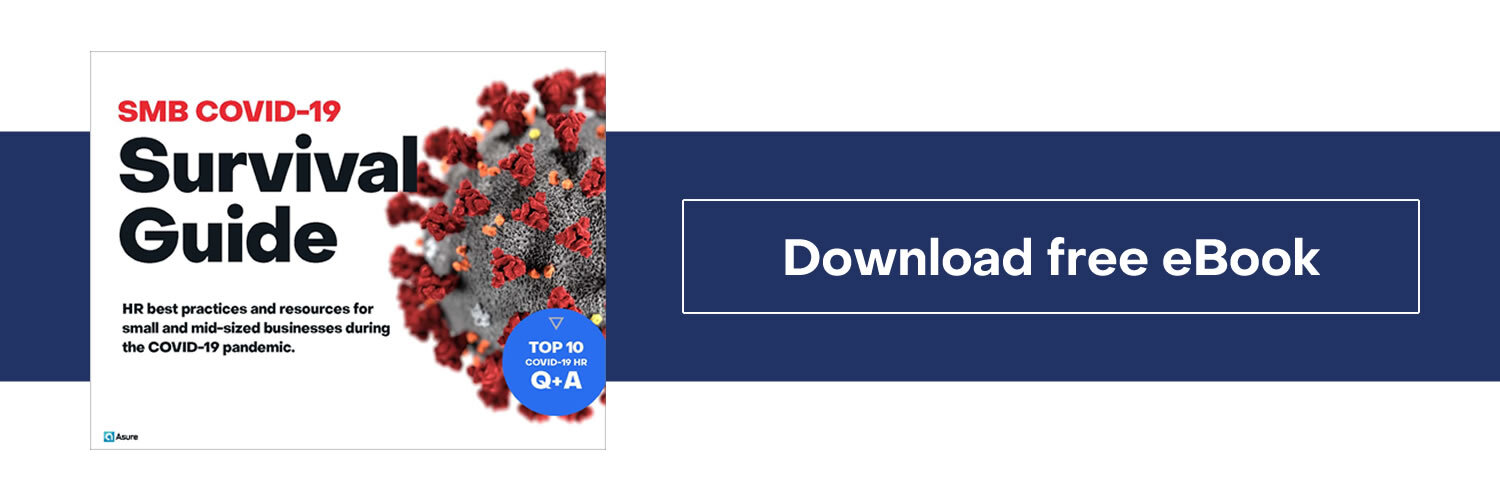Employers should check Federal, State and Municipal guidance often for updates that impact their business and their employees. To help you stay on top of this rapidly evolving situation, Asure has compiled a list of Federal, State, U.S. Territorial, and select Municipality websites with coronavirus updates and guidance.
Leaders of small and mid-sized businesses have been closely watching the news about COVID-19 and the government’s response to it. Already, two economic stimulus packages has been enacted, including the Families First Coronavirus Response Act, and news reports indicate Congress is nearing agreement on a third stimulus bill for a possible vote this week.
Economic stimulus programs will be a big part of financial recovery for businesses and their employees. At the same time, it’s also critically important to provide a safe and healthy work environment in compliance with federal, state and local coronavirus health guidelines for employers.
Who’s in charge of company coronavirus safety requirements?
In smaller businesses, leaders must take charge of monitoring compliance with federal, state and local orders to ensure an OSHA safe workplace for their employees, customers and visitors. In mid-sized companies, leaders will also need to involve Human Resources to communicate with and educate employees and Facilities Management to implement more frequent/stringent cleaning and sanitation procedures as well as install and maintain hygiene-related fixed assets including hand sanitizer stations.
Can your business remain open to the public?
The first workplace safety item to consider is whether your business is allowed to be open right now. The decision to remain open affects your customers and your employees, any of whom can become exposed to COVID-19 and transmit the virus before they appear ill or have symptoms.
Many states and municipalities have closed non-essential or non-life-sustaining businesses for a period of time. Others have simply restricted the number of customers that could be in a business establishment at one time in order to maintain social distancing. Even businesses that are considered essential may need to change their operational model during the pandemic, for example, in many places, restaurants can deliver or offer take-out food, but aren’t able to keep dining rooms open.
Closely monitor CDC and OSHA guidance
To ensure healthy workplace compliance, businesses should closely follow CDC guidance and OSHA guidance for coronavirus workplace safety. Here are important resources you should consult:
CDC Interim Guidance for Businesses and Employers
CDC Cleaning and Disinfection Recommendations
OSHA Guidance on Preparing Workplaces for COVID-19
EPA List N: Disinfectants for Use Against SARS-CoV-2
As you review the guidance, you’ll find that workplace safety issues surrounding the coronavirus pandemic generally fall into these areas:
-
Preparing the work environment for COVID-19, including development of an infectious disease preparedness plan
-
Reducing employees’ (and customers’) exposure to COVID-19
-
Educating employees about how they can reduce transmission
-
Maintaining a healthy workplace through proper cleaning and sanitation, providing telework options, and encouraging workers to stay home if sick.
-
Responding to positive cases of COVID-19 in the workplace
General guidance for OSHA compliance
At a high level, OSHA provides several simple rules for employers and employees to help them stay safe during the pandemic. OSHA recommends that “employers of workers with potential occupational exposures to coronavirus” should:
-
Assess the hazards to which workers may be exposed.
-
Evaluate the risk of exposure.
-
Select, implement, and ensure workers use controls to prevent exposure, including physical barriers to control the spread of the virus; social distancing; and appropriate personal protective equipment, hygiene, and cleaning supplies.
To avoid getting the virus, both employers and employees in the workplace should:
-
Frequently wash hands with soap and water for at least 20 seconds.
-
If soap and running water are not available, use an alcohol-based hand sanitizer produce that contains at least 60% alcohol.
-
Avoid touching your eyes, nose, or mouth with unwashed hands.
-
Avoid close contact with people who are sick.
When someone tests positive for COVID-19
If an employee becomes sick with COVID-19, or if the health department contacts your company about anyone who visited your facility testing positive for the disease, you will need to take additional actions immediately:
-
Send employees home so that you can deeply clean and disinfect the workplace.
-
Inform employees who are likely to have had contact as well as the person’s supervisor that an employee has tested positive for COVID-19. Do not violate the HIPAA privacy of the employee who has COVID-19 while communicating with your team about the situation.
-
Ask employees who may have had contact to self-isolate for 14 days and monitor themselves for any symptoms, including taking their temperature. They can work from home if they feel well, but they must not reenter the building for any reason before fourteen days have passed.
-
Follow any additional guidance provided by your local public health authorities.
Additional guidance for higher risk industries and workers
Workers in some types of businesses will need to be provided with additional training, procedures or equipment in order to stay safe. In addition to OSHA’s general guidance for employers, the agency published specific advice for employers and workers in the following industries:
-
Healthcare
-
Deathcare
-
Laboratories
-
Airline operations
-
Border protection
-
Solid waste and wastewater management workers
-
Business travel abroad
We are in this together
These are frightening times for all of us—entrepreneurs, small business owners, executive leaders, and employees. At Asure, we are committed to connecting you with the right news and resources to help you protect your business and your workers.

